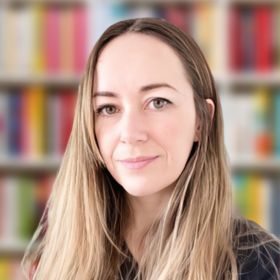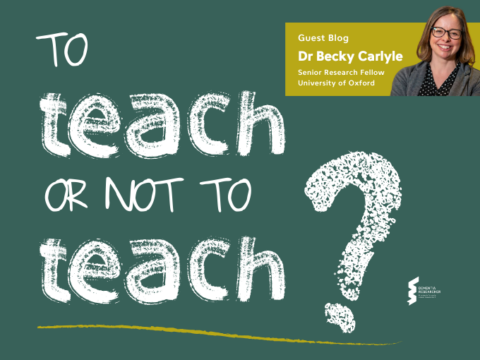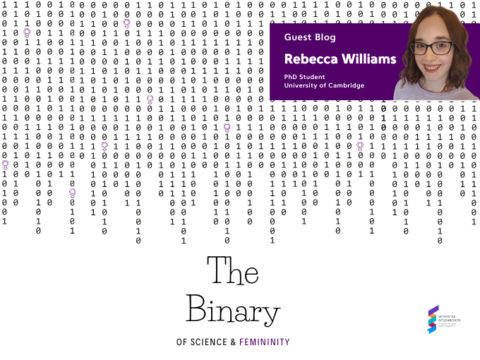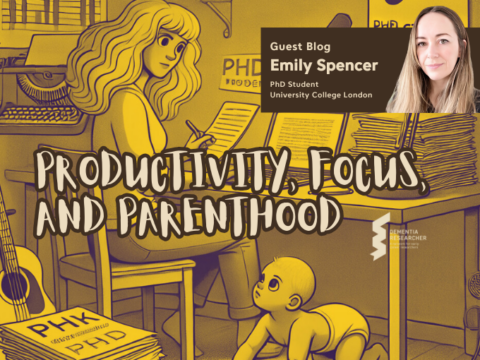At the time of writing, I’m freshly returned from two weeks off work – the first break I’ve taken from my PhD since returning from maternity leave last summer! It’s safe to say that I’m now lightyears away from the newborn stage, and am safely settled back into work – although that doesn’t mean I have a handle on things. As will no doubt become tradition, this month in my series on academia and parenthood, I’ll be contemplating how I can continue to make my dual life work for me (and everyone else).
It seems wild to me that my child is now one. Partly – and entirely embarrassingly – because I have been so poor at communicating this news to my distantly-located friends. A couple of weeks ago I had the horrifying experience of receiving a message from my old housemate asking what I’d been up to, at which point I had to admit that I was pregnant. I was pregnant. In 2023. I was no longer pregnant, because I had a one-year-old. There is no way to communicate that information to someone who has been a good friend for 10 years without it seeming slightly awkward. I went to the football with another friend last week and had to have a very similar conversation face-to-face. Awful. Weirdly, the night before my son’s first birthday, I became uncharacteristically emotional at the idea I wouldn’t have a baby anymore. Overnight, he would become a toddler! I wasn’t ready for it!
My husband and I were reflecting on the early days – the week we spent in hospital, and then the first month or so when our son was frankly terrifying. He seemed so incredibly fragile, and both of us were so scared of inadvertently harming him, or of doing the wrong thing. Those who have encountered my one-year-old will know he is now anything but fragile… Given how tall and solid he is, he probably looks like a bit of a bruiser. At a recent antenatal class meetup, a couple of the other parents asked if they could pick him up just to see how heavy he was!! In addition to him being more sturdy, though, the two of us are thankfully a lot more confident in our care of him; not so panicked about doing the wrong thing, not so obsessed with everything being ‘right’.
I’m fortunate in that from the beginning, my husband has looked to share as many responsibilities with me as he can, particularly in ways that enable me to take time out for other activities. This means that I’ve been able to get back to playing football on a Thursday, can go watch Spurs play, or can often be out for a good few hours on a Sunday morning to play guitar at church. I am aware, though, that our little boy is constantly changing, which means that some weeks are a lot more challenging than others. There are times when taking care of him single-handed even for a day can feel quite costly.
A couple of months ago, my colleague got in touch to ask whether I’d like to go on a writing retreat. This is something we had previously done together, and which I in particular found incredibly helpful and productive. There are a couple of papers we’d like to work on for an old project, so going on a retreat together would be a great way of kick-starting them. I have to hold my hands up and say that rather than kick-starting anything, for the last couple of months I have been firmly kicking that can down the road, refusing to commit (sorry Sarah!!).
I would love to go on a writing retreat, but worry about putting too much pressure on my husband through my absence – particularly as we are limited in terms of our access to childcare.
This is something I’ve been thinking about more broadly too with regard to my career. While I was pregnant I travelled to two conferences – one in the UK, one overseas – to present my work. Conferences are a vital part of one’s research career, not only for dissemination but also for networking opportunities. I’d also be lying if I didn’t say that travelling to international conferences is something of a perk of academia! But it’s hard to fathom how to take these opportunities when you also have a young family. Some conferences, funders or institutions do allude to provisions that can enable those with caring responsibilities to attend, but in my experience this can often be quite opaque or poorly-advertised. When I have limited headspace, and when the idea of going away quite frankly makes me feel pretty guilty, asking for help can seem like too much of a barrier. I would love there to be greater transparency and signposting, so I can know from the outset whether or not asking for help is worth investing my (increasingly limited) time.
Despite all my procrastination, I came to the conclusion that my family would be able to cope for three days without me, and a writing retreat was worth making it work. I managed to find some dates that were slightly easier for us to manage, and I committed! It won’t always be easy for me to feel like I’m getting the balance right, or for choices to automatically suit everyone, but I trust that there will be space in our family for me to make the occasional choice for my career, and somehow we’ll make it work.

Emily Spencer
Author
Emily Spencer is a PhD Student at University College London looking at improving how GPs communicate with people with dementia and their family carers about their future care. Emily previous had a 5 year career break to pursue a career as a musician, and has previously undertaken research on improving the care people with dementia receive from their GP practice, as well as end-of-life and palliative care provision in the community. Emily is also a new mum and will be writing about her experiences navigating motherhood and a research career.

 Print This Post
Print This Post





